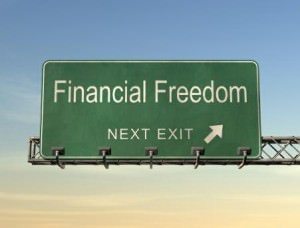When you are in the middle of a recession it is more difficult to keep your personal finances in order. These six tips will help you become financially independent in good times and bad.
What is financial freedom
Financial freedom is much more than having money. It’s the freedom to be who you really are and do what you really want in life. And many of us, especially women, lose site of this by putting others first and playing many different roles such as parent, spouse, employee, friend, and more.
If you want to be financially-free, you need to become a different person than you are today and let go of whatever has held you back in the past. It’s a process of growth, improvement and gaining spiritual and emotional strength to become the most powerful, happy, and successful “you” possible. That is the true reward of financial freedom.
How to Achieve Financial Freedom
 The first step is to use a personal savings calculator to determine how much money should be put away in savings. There are several of these calculators available online. Find one that takes into account your entire income, your regular bills like rent or mortgage and utilities, and debts such as credit cards and student loans. You can also use mortgage and other debt calculators to determine the benefits of paying a little extra on your loans to pay them off more quickly.
The first step is to use a personal savings calculator to determine how much money should be put away in savings. There are several of these calculators available online. Find one that takes into account your entire income, your regular bills like rent or mortgage and utilities, and debts such as credit cards and student loans. You can also use mortgage and other debt calculators to determine the benefits of paying a little extra on your loans to pay them off more quickly.
Choose savings accounts that have good benefits. You should have two savings accounts- one for long-term savings and one for short-term savings. Do not just get a savings account at the same bank where you have a checking account. You can often find better interest rates and fee structures at other banks. One good bank for savings is ING Direct, which does not have a minimum balance and has a competitive interest rate.
Once you have a good savings account and have used the personal finance calculator, use the information you have learned to determine how much discretionary income you have each month for savings and paying off debts. The quicker you pay off a debt, the less you will pay in interest and fees. Do not neglect savings to pay off debts, but keep a balance between paying extra towards debts and adding to your savings.
If you earn $60,000 a year, you should be spending less than $50,000 a year. Spending more than you earn puts you into a financial hole that is difficult to climb out of quickly. If you are living paycheck to paycheck or even, heaven forbid, taking out payday loans to get you through the month, then you are already in deep trouble. An illness or loss of job will leave you homeless quickly if this is your financial situation. Always spend less than you earn!
Pay attention to where you spend your money. A coffee from Starbucks may only cost four dollars, but if you get two coffees, five days a week, you are spending $40 a week on Starbucks! You could get a nice coffemaker and thermos for $40 and by making your coffee at home, you will save $160 a month. Cut out unnecessary expenses. If you examine how your money is spent each month, you will find a number of expenses that are not necessary. Cut these out, or budget these things as a special treat.You can make thousands, and enjoy financial freedom if your income is greater than your spending.
Keep copies of your bank statements so you can see where your money is going. There are financial products that can help you identify spending trends over time, and you can even see pie charts that show you what percentage of your income is spent on housing versus groceries. Quicken is one such program, but there are many others. Check your spending patterns every three months. You may be surprised by what you learn.
It is not difficult to put together a financial freedom plan, but actually doing what you need to do to achieve financial independence is not always easy. If you make a mistake, shake it off and move on. You can do this!
